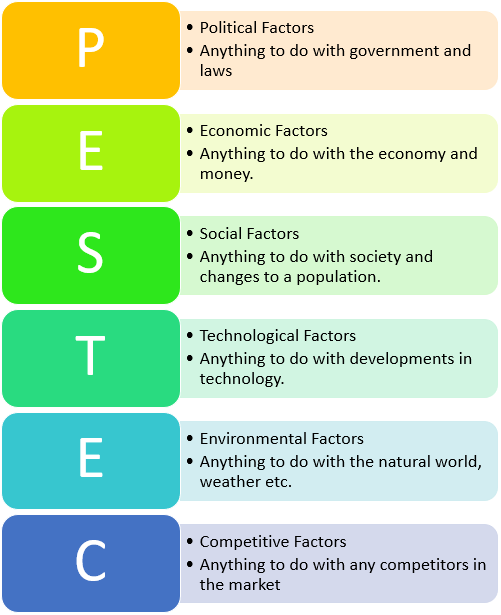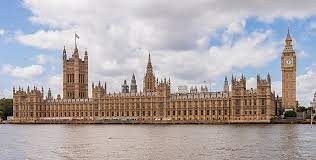All businesses must react efficiently to changes in its external environment – failure to do so could be fatal for the future of the business. External factors (PESTEC) can be summarised as follows:
Political
The government can introduce laws which can affect every business in the UK.
- For example, the government have set laws which ban advertising tobacco on television. Business must comply with laws or face heavy legal penalties.
- The government can also affect businesses by changing the amount of corporation tax charged on business profits.
- They have also introduced a minimum wage which employers must pay – this will affect their costs and profits.
Economic
This is how the economy affects a business in terms of taxation, government spending, general demand, interest rates, exchange rates and European and global economic factors.
- If there is a recession and unemployment is high, consumers will have less income, which will result in a loss of sales for businesses.
- In order to survive and encourage consumers to buy from them, businesses may have to ‘slash’ prices and accept a cut in profits just to survive.
Social
Social can be split into two: demographics and socio-cultural
Demographics is the make up of the population e.g.:
Age structure of population (UK slow-growing and ageing)
- Gender
- Family size
- Changing nature of occupations (growth of service sector)
Socio-cultural includes fashions, fads and changes in taste and cultures. Businesses have to keep up to date with trends to avoid looking out of touch. Examples:
- Use of current celebrity for endorsements
- Increase in healthy eating/dieting/exercise in January and Summer months
Technological
Advances in technology are happening at a phenomenal rate. Firms must keep up to date with technological innovations so that they are efficient and remain competitive by changing the way it operates e.g. self-service checkouts at supermarkets. Put simply, businesses must keep up with changes in technology. For example:
- They must for example get involved in e-commerce
- They must also use technology and robots in production lines when making their products.
Failure to keep up with technology could lead to a fall in sales and profits.
Environmental
This covers climate change, weather, pollution and how these may affect sales/profits.
- There is now increasing pressure for firms to be environmentally friendly, eg, bags for life and to minimise pollution.
- Business can also be seriously disrupted with extreme weather conditions like storms, floods and snow.
Competitive
When you set up in business it is unlikely that you will be the only person producing that product or providing that service. This is known as competition which can in fact be a positive thing in that it encourages businesses to be effective. However, competition can also force a business to react to situations in a way that they may not have planned eg if the competition lowers the price of their product.
A business could react to an increase in competition (eg a launch of rival product) in the following ways:
- Cut prices
- Improve quality
- Spend more on promotion
- Cut costs
- Create a Brand name
In addition to PESTEC, there following are other external factors which could impact a business, its behaviour and future plans.
The Effect of Scarce Resources on a Business:
No resource will last forever and this can prove to be a concern for many businesses. Some resources are harder to find than others, for example:
- Skilled labour – Businesses can find it hard to find people that can do the jobs needed e.g. computer experts
- Land and Premises – In City Centres it is very difficult to find space
- Specialist equipment – This can be very expensive e.g. hospital scanners
- Money – Always limited in that no-one has enough and borrowing is more difficult and costly for a smaller business than it is for a large one
The resources a business uses, both financial and human, are limited in supply. Careful choices have to be made in order to maximise profits. If a business finds it cannot obtain the resources it needs this will affect the business’s ability to achieve its aims.
The Effect of Ethical Practices on a Business:
Firms now have a greater social responsibility to behave in an ethical manner. That means they must have a code of practice which ensures they carry out their business practices taking into account what is morally right or wrong for a business to do. For instance, should a firm trade with countries which have a poor record on human rights?




